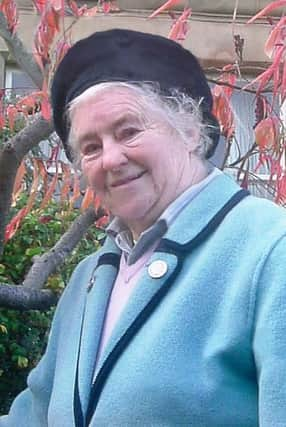Obituary: Margaret Street MBE, tireless campaigner for culture and heritage who founded Leith Civic Trust


Margaret Street was an indefatigable campaigner whose love of Scotland’s culture and heritage informed her every crusade.
A former civil servant who gave up her career on marriage, she spent the best part of half a century championing causes close to her heart: protecting significant buildings, founding Leith Civic Trust and ensuring notable Scots, such as the forgotten Orkney explorer Dr John Rae, were suitably commemorated.
Advertisement
Hide AdAdvertisement
Hide AdThe daughter of a hosiery warehouseman turned publican, she grew up during the difficult years of the Great Depression when her family survived on a meagre £1 a week, and was educated at Hawick High School and Alva Academy.
A bright young woman, in 1938 she embarked on a career in the Civil Service, where she did well, and spent a decade working mostly in the Ministry of Labour and National Service, with her final year in the Ministry of National Insurance Inspectorate.
Following her wedding to Richard Street, in December 1948, the career options for a married woman were limited and she opted to leave the Civil Service, a decision which would allow her to concentrate on voluntary work, something in which she had already become involved.
In the mid-1950s, with a growing interest in women’s rights, she took part, along with ten other women, in a campaign to save the women’s hospitals, Bruntsfield and Elsie Inglis Memorial.
During the 1960s her passion for conservation and Scotland’s culture saw her campaign against a the proposed Edinburgh Inner Ring Road and various proposed demolitions of property, notably 11-15 Canongate, a 17th-century tenement now restored and known as Russell House.
And with Laura Grimond, wife of the former Liberal Party leader Jo Grimond, she opposed Orkney Council’s decision to demolish Papdale House, Kirkwall, home of the historian Malcolm Laing. She was also linked with the founding of Orkney Heritage Society, helped in saving Kirkwall’s historic street The Strynd, and in the restoration of St Magnus Cathedral.
She founded Leith Civic Trust in 1968 and was involved in fights to save local landmarks, including historic Lamb’s House and King’s Wark which, had they been lost, would have resulted in a very different vista of The Shore. She served as trust secretary and chairman and latterly was a patron.
The 1970s saw her, as secretary of the Mungo Park Commemoration Committee, work alongside the Duke of Buccleuch to save the explorer’s birthplace at Foulshiels, near Selkirk, from demolition and organise a bicentenary exhibition.
Advertisement
Hide AdAdvertisement
Hide AdOther campaigns during that decade included attempts to save the home of Chambers publishers and Stobo Castle, both in Peebleshire. She also raised funds, with her neighbour Captain Ronald Leask, to save Scotland’s last remaining lightship, the North Carr Lightship, when it was decommissioned. And she helped to set up the John Buchan Centre in the Old Free Kirk, Broughton.
She went on to become a representative of the Patients Association on Edinburgh Health Council and in 1985 was part of the committee to buy Hugh MacDairmid’s cottage by Biggar for the local authority.
Two years later she helped in the project to restore Naismyth Bridge, Almondell.
Throughout this time she had been a long-standing member of the Saltire Society; she served as vice-chairman for more than a decade, before taking over chairmanship from 1995-97, during which time she represented the Society on the National Trust for Scotland’s Council.
A key campaign then was the successful defence of the capital’s National Portrait Gallery which was threatened with closure and the transfer to Glasgow of its core collection.
She had also been active in moves to commemorate various Scots with plaques noting their achievements. They included Mungo Park; the documentary maker John Grierson; Thomas Cochrane, 10th Earl of Dundonald; composer Francis George Scott; and Dr John Rae, who sparked controversy by concluding that men of the Franklin Expedition, who had survived the doomed search for the Northwest passage in the Arctic Ocean, had resorted to cannibalism. Rae subsequently found the passage but his achievements were largely ignored. Her interest in the explorer stemmed from a connection with Orkney, which resulted from her friendship with Lord Birsay who was an elder at St Andrews (now St Andrew’s and St George’s West) Church in Edinburgh, which she regularly attended.
A dauntless campaigner, she was also the Saltire Society’s convenor of appeals to restore the Wallace statues in Dryburgh and Lanark and of its Robert Hurd appeal, which fundraised to finance the Society’s annual prize at Edinburgh College of Art.
Such steadfast service was recognised with the Society’s Andrew Fletcher of Saltoun Award for services to Scotland. Made an honorary member of the Society in 1997, her achievements were acknowledged UK-wide when in 2003 was awarded the MBE for services to the built and cultural heritage of Scotland.
Predeceased by her husband, she is survived by their sons Iain and Neil.
ALISON SHAW